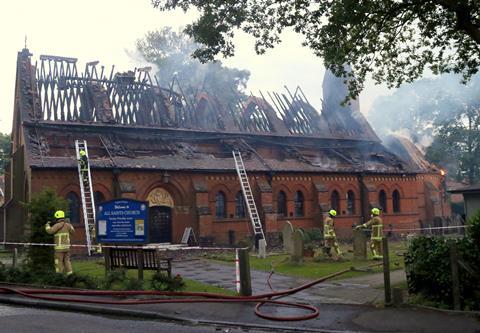Deliberate arson attacks on churches are part of a wider increase in hate crimes against Christians. But who is to blame? Heather Tomlinson investigates

A symbolic resurrection will take place in Paris in two weeks’ time when the Notre Dame Cathedral reopens, five years after the historic building was destroyed by fire.
This medieval icon is just one of hundreds of churches across the world to be engulfed in flames in recent years. There is growing evidence that some have been targeted due to hatred and bigotry towards Christians – even in Western countries. Known attackers include political extremists on both the left and right, Islamic radicals, and even satanists.
Of course, church fires have occurred throughout history due to war or the inevitable faults in old buildings with wooden construction. The 2019 blaze that destroyed the Notre Dame Cathedral was officially declared accidental, while York Minster’s flames in 1984 were started by a lightning strike.
But concern is growing about deliberate arson, particularly in France, where a number of attacks have hit the headlines. A church steeple caught fire in Saint-Omer in northern France in September, with signs of forced entry. In 2016, a team of young jihadists attempted to set fire to Notre Dame Cathedral, but were caught and imprisoned, fuelling rumours that the 2019 fire was not accidental and the authorities were not honest about the cause.
This is why videos of church fires feature regularly on right wing social media, often with sarcastic comments such as “strange coincidence” or “I’m sure it’s just an electrical fault.” They imply Islamists are to blame, fuelling an anti-immigrant narrative. To this end, a map of France covered in red marks has been widely shared on social media, purporting to show a church arson crime wave. It was declared “false” or “misleading” by Reuters because it is out of date and represents an unofficial blog’s tally of all vandalism against churches – not just arson.
Yet it could be argued that Reuters ignored the real story: more reliable evidence of widespread attacks against churches that are fuelled by hatred of various kinds, of which Islamic extremism is just one.
Fiery statistics
Churches are torched regularly where Christians are persecuted, such as Nigeria and India. Yet the practice appears to also be taking place in Western countries usually perceived as safe for Christians.
“Between 2021 and 2022, there has been an increase in anti-Christian hate crimes, specially arson attacks,” reported the Observatory on Intolerance and Discrimination against Christians in Europe (OIDAC Europe) last year. Arson attacks that were classed as hate crimes rose from 60 to 105 in 2022/23, the report said: Germany had 37 arson cases, France and Italy had 16, and the UK nine.
However, reliable data from Ecclesiastical Insurance suggests a more significant problem in this country. “In the last five years there have been over 200 incidents of arson affecting churches,” said a spokesperson for the popular insurer of Christian buildings. “This has caused millions of pounds in damages… arson is often as a result of the actions of an individual and with no clear trends.” She said that 2019 was worst in the past five years, although lower than 2006 when there was over 100 incidents.
In the last five years there have been over 200 incidents of arson affecting UK churches
In France statistics differ, but the underlying problem is clear. There were 102 arson attacks on churches reported in the five years 2018-2022 classed as “hate crimes”, according to data from the Organization for Security and Co-operation in Europe, which reveals that Christianity is usually the most targeted religion in France in any given year.
In 2023 the Observatory of Religious Heritage (OPR), a French body that preserves historic places of worship, said that of 27 fires in churches it was aware of, eight were of criminal origin, and 19 accidental. For the first nine months of 2024, out of 26 fires reported, 14 were of criminal origin and 12 accidental - a “sharp” increase since 2022, it said.
Why burn churches?
The explanations for deliberate fire setting vary. Reports of convictions for church arson in local newspapers around the world show that a common cause is mental illness, or “pyromania”- a persistent desire to start fires, with no particular ideological reason.
The Saint-Omer torching was followed by the swift arrest of a repeat offender who had only been out of prison a few days for other arson offences, according to Le Monde. It said the suspect, a French national, had told a previous court that he targeted churches due to his belief that priests are sex offenders.
There have been so many arson and vandalism crimes against religious buildings in France that the government investigated, and concluded in its report: “The cases that have been solved show Islamist, far-right, far-left and satanist profiles, in addition to the unbalanced and minors who are probably overrepresented, being a priori easier to spot.”
There is particular concern about anti-Christian hatred in France after the murder of Father Jacques Hamal in 2016 by jihadists, and a violent attack on Father Joseph Eid in 2023 by assailants reportedly crying “dirty Christian”. Across Europe there has been a huge increase in reported hate crimes against Christians, mostly vandalism, but also violence, threats and arson. There has been an extraordinary annual increase in total European anti-Christian hate crimes in 2021 to 2023: from 519 to 748 to 2,444, according to the OIDAC.
The body said hate crimes were “perpetrated by radicalised members of ideological, political, or religious groups that follow an anti-Christian narrative,” in last year’s annual report. “In the case of anti-Christian hate crimes, our research shows that one of the main sources of aggression are radicalised members of extreme political groups, with a majority of cases coming from far-left political groups, such as Antifa, radical feminists, or LGBTQI groups. Furthermore, we have documented attacks by radical individuals from far-right groups, satanist groups, and radical Islamist groups.”
Marc Eynaud, the French author of Who wants to harm Catholics? Fires, desecration: facts we don’t want to see told Le Figaro in 2023: “Between the looting, the desecration, the fires, the physical attacks against priests or even the faithful, the media attacks also which contribute to legitimizing in some way the concrete violent acts… all this contributes to the same more or less conscious objective: to eradicate Christianity.”







































No comments yet